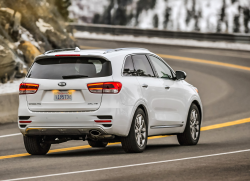— Hyundai and Kia acceleration problems caused a defect petition that requested a formal investigation by the National Highway Traffic Safety Administration.
The petitioners blame alleged acceleration problems on defects in the electronic throttle control systems in these Hyundai and Kia vehicles.
- 2005-2016 Kia Optima
- 2005-2016 Kia K5
- 2006-2015 Kia Sorento
- 2007-2016 Hyundai Elantra
- 2007-2016 Hyundai Santa Fe
- 2006-2015 Hyundai Sonata
However, federal safety regulators found no evidence as alleged in the November 2021 petition to investigate.
NHTSA analyzed complaints about Hyundai and Kia speed control problems and found no trend to warrant a formal investigation.
Out of 1,119 unintended acceleration reports, 220 involved alleged crashes and 69 of those Hyundai and Kia vehicles were inspected by dealers, engineers or third-party investigators. No electronic throttle control defects were found.
"Of the 220 crash-involved reports, 13 Event Data Recorder (EDR) records were downloaded successfully and 11 of those indicated driver error: (i.e.) pedal misapplication. A condition where the accelerator pedal is mistakenly applied instead of the brake pedal when the driver wants to stop the vehicle." — NHTSA
Regulators also reviewed a scientific journal and related test videos but found no evidence of unintended acceleration problems.
Hyundai and Kia told NHTSA all the vehicles manufactured after 2012 are equipped with electronic throttle control management systems known as brake-throttle override systems.
The system controls the engine speed which will go to idle when the system sees signals from both the brake pedal and accelerator pedal at the same time.
NHTSA says based on all available evidence, the petition to investigate Hyundai and Kia acceleration problems is denied.

